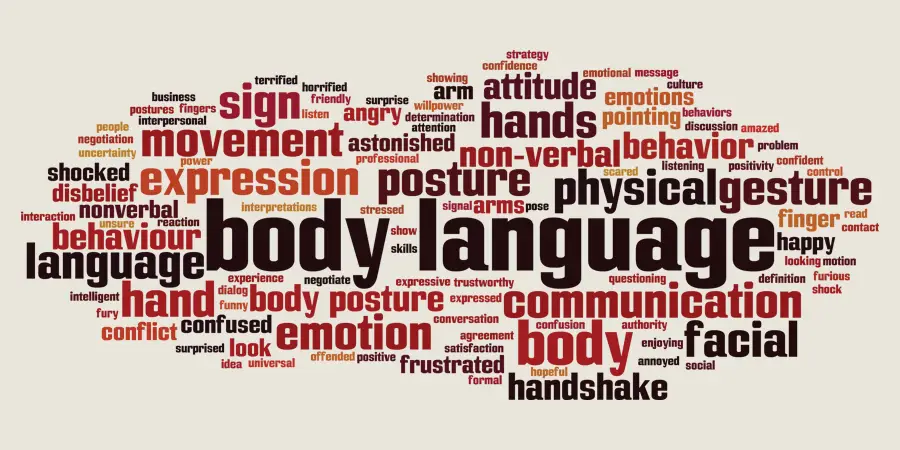Enhancing Non-Verbal Communication Skills at NCU: An Important Aspect of Personality Development


Communication does not always require words to communicate or express one’s feelings. There is a common proverb that says, “Silence speaks louder than words.” This holds true in the case of non-verbal communication. In fact, it’s clearer and more comprehensive than verbal communication. Others can understand the intended meaning with ease.
Words can lie but the expression on one’s face never lies. It shows the true feelings and thoughts of an individual. The smile on one’s face, the frown, the curved lips, posture, gestures, they say it all.
Body language and word language do not normally operate exclusively but complement and supplement each other. Both the languages also together produce a joint impact with positive or negative manifestations. However, body language is not always within the complete control of an individual. It frequently betrays him by raising the veil of pretence from the face of reality.
In spite of this grave limitation, which is more powerful than what it apparently looks to be, an individual can still constructively endeavour to minimise the negative impact of his self -revealing demeanour and maximise its positive effects. Since they play an important role in one’s career and in this competitive world.
At The NorthCap University, one of the leading Universities in Haryana, students are trained to work on their non-verbal communication skills, This, by no means is easy, but in view of the expectancy of enormous incidental gains in future becomes justification enough for diligently cultivating non-communication skills.
What constitutes Non- Verbal Communication Skills?
Non-verbal communication is a powerful tool to assess one’s personality. It includes everything everything except verbal communication. Listeners not only process verbal communication but also non-verbal cues automatically and they don’t have to make any conscious effort in this. Using appropriate gestures and facial expressions to emphasise what one wants to convey adds more to the conversation and also makes it more appealing. We should be aware that we are sending out non-verbal messages all the time. So, becoming more self-aware of how we speak, the impact of our mood, of dress and even the way we stand or sit increases self- awareness. Using non-verbal cues deliberately and aptly is the best way to improve non-verbal communication and create a lasting impact on others. Students at NCU are groomed to work on their non-communication skills. Special compulsory classes are conducted for all the students pursuing any programme or course which gives them a competitive edge in the market.
Types of Non-Verbal Communication
There are several ways to check non-verbal communication which is useful in understanding what a person wants to convey as listed below:
- Facial expressions and gestures: Our face conveys lots of emotions like happiness, anger, dismay, surprise, shock and so on. Similarly, gestures like waving, frowning, slouching. Raised eyebrows, smile etc. are consciously done to convey what we want to say or share. In fact, they act like an aid to our speech or verbal communication.
- Posture and Body Language: The way we conduct ourselves like the way we stand, sit, eat, talk tells a lot about our personality. It speaks volumes about a person. Through posture and body language one can check if the person is confident, defensive, or diffident. Students at NCU are given practice classes where they learn how to present themselves confidently and outshine during interviews, thus being successful in their professional journey.
- Eye Contact: It is a very important element of body-language. Eye contact shows one’s involvement or aloofness in a conversation.
- Proxemics: This means the proximity between individuals. It varies from one culture to another and also depends on one’s relationship with other individuals.
- Haptics: This involves communication through touch. It can convey comfort, empathy, or aggression.
- Power dressing: It’s very important in a professional setup. It conveys one’s personality traits, profession and social status and is a good determiner of one’s perception about himself.
The Importance of Non-Verbal Communication
Non-verbal communication is very important in the usage of effective communication. Non-verbal signals make one’s speech more engaging and interesting. It is a very important tool in maintaining relationships, since it helps in conveying emotions, sympathy, empathy, and aids in building and maintaining interpersonal relationships and building trust. However, these expressions and emotions can be controlled with practice. It is immensely useful in controlling conversations as they impact effectiveness and success in meetings with clients and customers. Students from all the three Schools at The NorthCap University are trained to enhance and project and use their nonverbal communication effectively. No doubt, once these skills are developed, they pave a way for professional success for our students. By controlling our non-verbal communication and also understanding other’s body language, gestures etc, we can create better understanding of situations, build strong bonds and handle situations skilfully.
Authored By
Dr Payal Khurana
Assistant Professor (Selection Grade)
Centre for Language Learning














